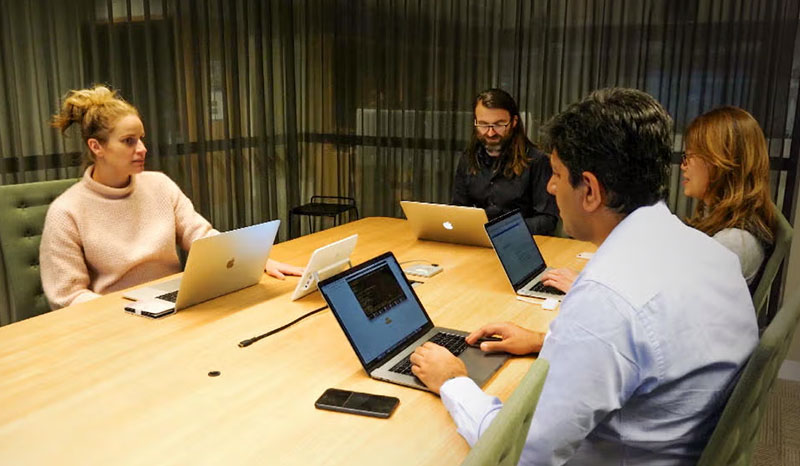Reflection has the power to demonstrate your achievements and true capabilities as an IT professional. Before reflecting on experiences in the workplace, it's common to feel the effects of something called 'imposter syndrome'.
Many of us remain unaware of the valuable leadership skills and capabilities we’ve accumulated over time. As a result, we may regard ourselves as being less capable or accomplished than we really are.
Meet former journalist, Dominique Barker. In 2011, she moved to Australia and began a career in information technology (IT) without any formal training. Six years later, she is sharing her experience of how switching careers left her feeling like an imposter, and how she overcame her self-doubt to become an accomplished IT management professional.
The prevalence of imposter syndrome
The cognitive bias that causes us to underestimate our capabilities is known as ‘imposter syndrome’ – a reluctance or inability to realise our accomplishments.
Some of the most successful people on the planet experience impostor syndrome by their own admission. But it’s also a state of being that many ordinary, everyday people experience to varying degrees.
There are many imposter syndrome tests online that you can complete if you are unsure as to whether you exhibit these traits. However, among the most susceptible to impostor syndrome are those who switch to a field for which they have little or no formal training. People like me – a former journalist who switched to IT.
What’s the key to overcoming it?
The answer, in short, is reflection.
I arrived in Australia from New Zealand in 2011, and my first role was in a small digital agency. Back then, to say I knew nothing about tech would be an understatement. Fortunately for me, I worked in a small firm that couldn’t afford experienced staff, but they were happy to train people on the job.
I started as an account manager but soon moved into digital producing – a relatively new type of role that straddled IT, project management and creative. All of a sudden, I was working with developers and technical experts, engaging with concepts like UX and CX design, information architecture and digital strategy – concepts of which I had limited knowledge.
Employers tend to find ways of getting rid of employees who aren’t getting the job done – particularly in the demanding and fast-paced environment of digital production. Yet, even after five years working in this field, I consistently perceived myself as the impostor with a Bachelor of Communications, flailing about in a sea of tech-heads with IT degrees.

Dominique consistently perceived herself as the impostor in the IT industry because she had a degree in a different discipline.
It’s in this kind of environment that imposter syndrome thrives – particularly for a woman in an industry like IT, which is overwhelmingly dominated by males. In hindsight, it was patently ridiculous to think that way. Sure, I might not be able to code a website before breakfast, but that didn’t mean I was devoid of technical skills.
This was proven time and again when I enrolled in a master’s degree and began progressing through the curriculum. To use but one example, for my research project, I developed a framework for training artificial intelligence to make ethical decisions – hardly the kind of feat possible for someone who is completely devoid of IT expertise.
But what happens, in work and in life, is that you rarely take the time to stop and reflect on what you’ve done. Instead, you keep ploughing forward, all the while taking for granted the capabilities you’ve accumulated along the way. You learn something, you know it, you use it over and over and it becomes an autonomous part of your skillset.
Self-reflection is empowering
There is a tendency to overlook or ignore the capabilities that have snuck up on us over time. It’s easy to dismiss reflection as mere navel-gazing, but in reality, it’s a capability of itself; a discipline you need to practice; a muscle you need to train and exercise.
This realisation came to me during the credentialling process that formed part of my master’s degree. It was a formal process that required me to delve into my experience as an IT professional and mine it for evidence of specific capabilities in areas like problem-solving, self-management and digital literacy.

Dominique was able to delve into her experience as an IT professional and use it to gain a master's degree.
At first, I’d draw a blank. But with patience, it all comes into focus. It’s a bit like staring at a magic eye picture; what initially seems like an amorphous blob of ‘stuff’, gradually assumes its true form.
Your identity as a professional comes into focus when you begin to remember problems and challenges you’ve overcome; solutions you’ve developed and deployed; projects you’ve helped conceive and deliver. Underpinning each of these achievements are the skills and capabilities you’ve acquired and refined during your career, the growth that has remained invisible until now.
It’s quite illuminating to realise you’re no longer the novice of five years ago, but an accomplished IT professional with real skills and hard-earned capabilities you’ve refined over time. And it’s an experience that’s nothing short of empowering.
To learn more about our Master of Leadership online, visit our website or call 1300 043 524.



